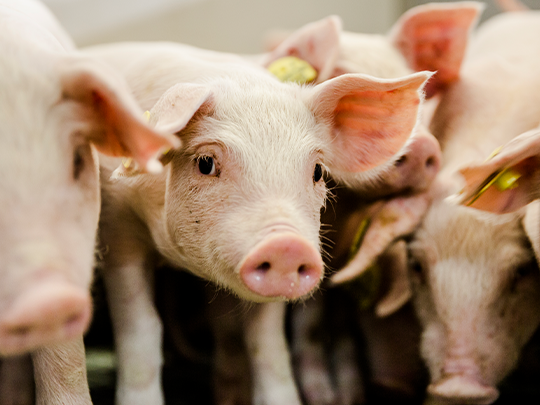Managing challenging times in the pig sector worldwide
Pork producers worldwide are facing challenges: they still must cope with African Swine Fever (ASF), declining hog prices, rising raw materials costs, and, as a result, decreasing profits.
At the global level, pig prices are falling tremendously. In October 2021, the FAO Meat Price Index was down 0.7% from its September value, making the third monthly decline (FAO, Nov 4th). Pork prices are also seasonally affected and will remain dependent on Covid-19 restrictions.
Additional pressure comes from labor constraints in some markets together with inflation costs, which is putting tension on production margins. Passing on these costs to end-consumers cannot be the only solution, as this may reduce their demand and dampen consumption, especially in income-sensitive countries.
What can be done to stabilize pork production and ensure the financial health of producers?

Given the increase in raw material prices and thus feed costs, the reduction of feed costs per kg of meat produced and the performance of sows throughout their lives are essential parameters for profitable pig production. In addition to management strategies, nutrition plays a crucial role in achieving those goals, as more and more attention is being paid to efficient nutrient management.
This is where phytogenic feed additives (PFAs) enter the game. PFAs also called phytogenics, contain various active substances such as essential oils, pungent and bitter substances, mucilages, tannins, or saponins solely derived from herbs, spices, and other plants. Many years of experience and literature have proven that active substances exert various beneficial effects on the digestive and metabolic processes and animal health.
Every piglet counts
Large uniform litters, a high number of weaned piglets, and increased body weights at weaning are the main prerequisites for sows and economic pig breeding performance. The improvement of litter performance in sows can be achieved with phytogenic solutions. Numerous studies have shown that certain phytogenics can improve feed intake and nutrient digestibility and significantly improve the number of piglets born alive and the birth weight of litters.

Trials have shown that piglets receiving specific phytogenic solutions have a higher chance of overcoming the weaning period in better body condition, better growth performance, and fewer intestinal diseases. Thus, natural substances can support producers in challenging times to maintain their productivity and financial health.
If we've made you curious and you'd like to read the full article on these current challenges in pig production, published in the Int. Pig Topics magazine, please click below.

Anja Keiner
After her scientific studies dealing with the effect of phytogenic substances on piglets’ health and performance at the Justus-Liebig university in Germany, Anja was eager to start her professional career with Delacon. Her experience in sales is an important backbone for the previous role as Product Manager Swine, but also for her current position as Global Technical Manager Swine and Poultry.










